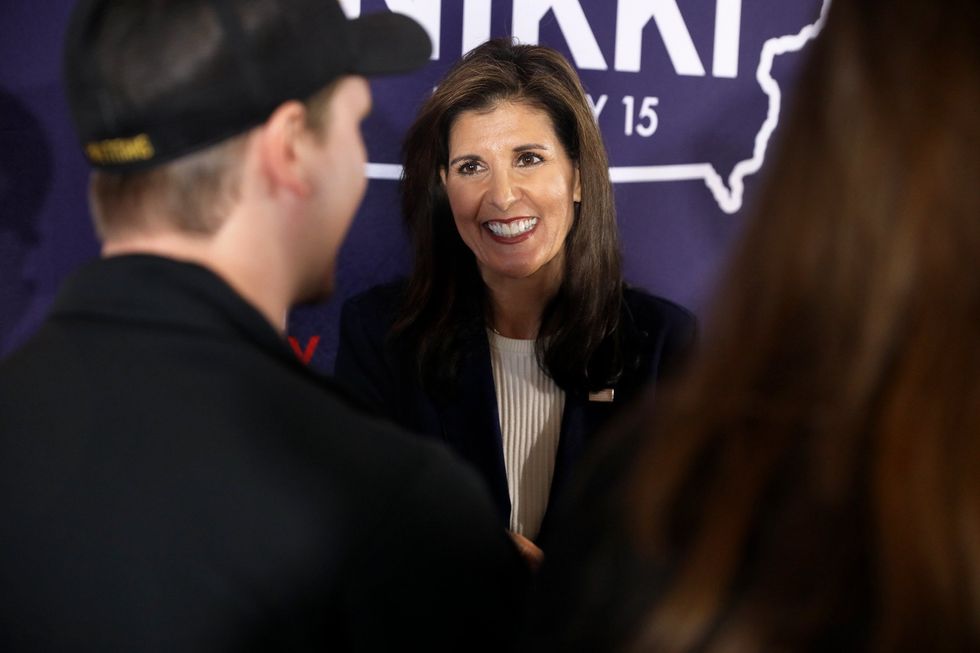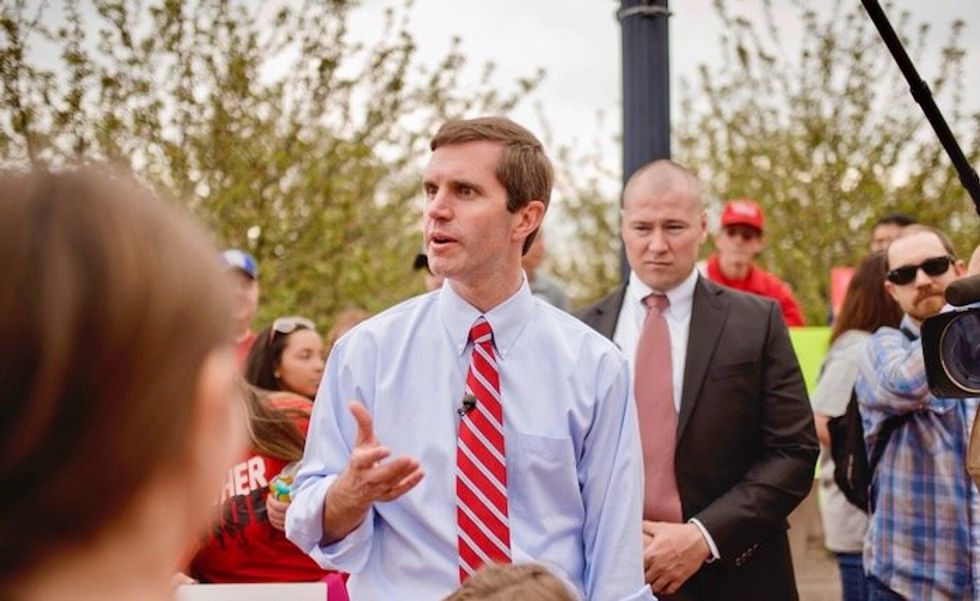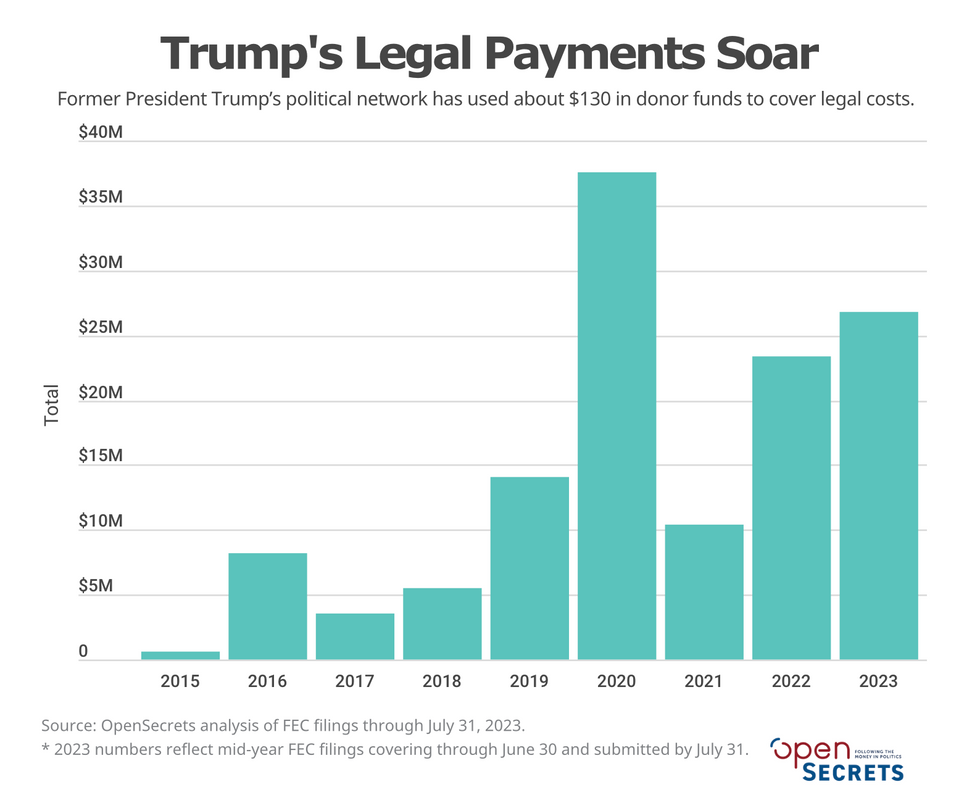Indicted member of Congress steers campaign funds to legal fees amid bribery allegations
This article originally appeared in OpenSecrets. Sign up for their weekly newsletter to receive stories like this one in your inbox.
Rep. Henry Cuellar (D-TX) has diverted over half of his 2024 campaign funds to cover legal fees as he faces charges related to allegedly accepting bribes from foreign actors in exchange for pushing policies favorable to them.
More than $784,900 of the roughly $1.5 million that Cuellar’s campaign spent in total through the end of March went to legal fees, a new OpenSecrets analysis found.
The payments represent a shift from previous cycles when Cuellar spent donor money mostly on media and other more typical campaign expenses.
In a statement denying the allegations, Cuellar claimed he “proactively sought legal advice from the House Ethics Committee, who gave [him] more than one written opinion, along with an additional opinion from a national law firm.
The bulk of the legal fees paid with Cuellar’s campaign funds went to Clifford Chance LLP, a British multinational law firm representing the congressman in the federal investigation. Cuellar’s campaign has paid the law firm about $690,000 since the start of the 2024 election cycle. No other federal political committees have reported payments to the firm.
Perkins Coie, a law firm known for providing political compliance and legal services to Democrats, received another $46,900 from Cuellar’s campaign coffers.
Cuellar’s campaign also paid $28,100 to Miller and Chevalier, a boutique D.C. firm that specializes in complicated financial cases and has represented former President Donald Trump’s onetime campaign chairman Paul Manafort, as well as several other candidates facing ethics inquiries or seeking counsel on other issues.
In February, Cuellar’s campaign started paying Mololamken LLP for legal services, racking up a $25,000 bill by March. The firm has only been paid by two other federal political committees. America First Action, a pro-Trump super PAC, paid Mololamken LLP during the 2020 election cycle and Rep. Lori Trahan (D-N.H.) paid the firm about $12,100 in March of 2020. That year, Trahan faced a House Ethics Committee inquiry into whether her campaign accepted impermissible contributions and misreported information to the FEC. The inquiry was dismissed two months later in June 2020.
Cuellar is the second high-profile Democrat in Congress to face bribery and foreign influence charges in the past year. In September, the Justice Department charged Sen. Bob Menendez (D-N.J.) and his wife after they allegedly accepted hundreds of thousands of dollars in bribes in return for promoting the interests of three New Jersey businessmen and benefitting the Egyptian government. Menendez stepped aside from serving as Senate Foreign Relations chair but pleaded not guilty. Opening arguments for the trial began May 16.
Like Cuellar, Menendez has precipitously ramped up legal spending while facing mounting legal issues. Since the start of the 2024 cycle, the Menendez campaign steered more than 70% of its campaign donor funds to lawyers. By far, the scandal-plagued senator’s top campaign expense is legal services this cycle — with over $2.5 million of the $3.6 million it has spent in total during the 2024 cycle going to legal fees.
Piecing together Cuellar’s alleged bribery scheme
Prosecutors say Cuellar and his wife, Imelda, used shell companies to launder nearly $600,000 in bribes in exchange for agreeing to “influence U.S. foreign policy in favor of Azerbaijan” and advance the interests of a Mexico City bank from at least 2014 through 2021.
The Cuellars were charged with 14 counts ranging from conspiracy to commit bribery to wire fraud, money laundering and working on behalf of a foreign government. The Cuellars made their first court appearances on May 3 and were each released on a $100,000 bond. If convicted, the Cuellars could face up to decades in prison.
The Texas Democrat’s efforts to push U.S. policy in favor of Azerbaijan ranged from delivering a speech promoting Azerbaijan’s interests on the House floor to integrating language into spending bills to bolster U.S. backing for Azerbaijan. He also helped kill legislation supporting Armenia in its decades-old conflict with Azerbaijan.
Cuellar’s connections to Azerbaijan go back to at least January 2013, the same month Cuellar was appointed to the House Appropriations Committee. It was also the month that Cuellar and his wife flew to the Eastern European country on a trip sponsored by an entity calling itself the Turquoise Council of Americans and Eurasians, according to congressional disclosure reports.
The Turquoise Council of Americans and Eurasians was run by Turkish-American businessman Kemal Oksuz, who also formed the Assembly of the Friends of Azerbaijan months after Cuellar’s trip. The Office of Congressional Ethics later found that Oksuz “used the entities interchangeably.” The indictment’s description of “Individual-1” appears to reference Oksuz.
In disclosures to Congress, Oksuz initially claimed that Cuellar’s January 2013 trip and a subsequent May 2013 congressional tour of Azerbaijan were paid for by the Turquoise Council and the Assembly of the Friends of Azerbaijan. But Oksuz later admitted that the May 2013 trip was paid for by SOCAR, the State Oil Company of Azerbaijan Republic, a national oil and gas company wholly owned by the country’s government.
Oksuz openly stated that the event’s corporate backers included SOCAR, Caspian Drilling Company and drilling fluids businesses such as M-I Swaco and Azeri M-I Drilling Fluids Ltd, as well as oil and gas companies British Petroleum, ConocoPhillips and Chevron. But he later confessed to concealing sponsors’ role in funding travel for members of Congress, which is legally required to be disclosed.
A 2015 report by the Office of Congressional Ethics found that SOCAR steered $750,000 to the nonprofits in May 2013, which was then used to fund travel to Azerbaijan for Congress members and staffers.
The May 2013 conference’s guest list included members of Congress, congressional staff, state representatives, former governors and White House officials. Oksuz estimated that the event cost roughly $1.5 million. Attendees were paid thousands of dollars in honorariums on top of “pricey gifts.”
After the Houston Chronicle found that all 10 members of Congress who participated in the trip to Baku supported pro-Azerbaijan amendments in the U.S. House, the Office of Congressional Ethics launched an investigation into the funding behind the travel.
While Cuellar did not attend the second trip, both excursions were reported as funded through the Turquoise Council of Americans and Eurasians and at least one of Cuellar’s staffers joined the second trip. The itinerary for Cuellar’s January 2013 trip also included a “briefing” at SOCAR and “dinner with SOCAR Executive Team.”
After that trip, Cuellar’s relationship with SOCAR flourished. According to the indictment unsealed on May 3, agents working on behalf of the Azerbaijani government recruited Cuellar to work with them on U.S. policy helping their country.
In July 2013, Cuellar spoke at a Washington, D.C. reception in honor of SOCAR to highlight the importance of a pipeline to deliver natural gas to Europe.
By September 2013, Cuellar had sponsored a resolution in Congress expressing support for Azerbaijan’s Southern Gas Corridor project, asserting that it was in the “U.S. national interest” to have the pipeline completed. The House Foreign Affairs Committee adopted the resolution and a portion of the pipeline began commercial operations to deliver gas from Azerbaijan to Italy in 2020.
Cuellar’s campaign also accepted money from Oksuz, including $1,000 in 2012 and $2,500 in 2015.
After Oksuz pleaded guilty to filing false statements and “orchestrating a scheme to funnel money to fund the trip,” prosecutors say payments from SOCAR to Cuellar paused.
Cuellar is also accused of accepting bribes in exchange for helping to further the political agenda of a Mexico City bank.
“Foreign Bank-1” appears to reference Banco Azteca, a subsidiary of Grupo Elektra, a retail and banking company that’s part of a corporate conglomerate led by Mexican billionaire Ricardo Salinas Pliego. In 2012, Grupo Elektra acquired U.S.-based payday lender Advance America, which matches the indictment’s description of “U.S. Affiliate-4.”
The indictment describes “U.S. Affiliate-3” as a Spanish-language media and entertainment company that appears to be TV Azteka, a subsidiary of Grupo Elektra under the umbrella of Mexican conglomerate Grupo Salinas.
In addition to fighting an anti-money laundering policy that threatened the bank’s interests, prosecutors say Cuellar tipped off its vice chairman about a proposal to pause the Consumer Financial Protection Bureau from making new regulations on the payday lending industry that could impact the company.
Similar to Cuellar’s arrangement with Azerbaijan, the Mexico City bank allegedly funneled fake consulting fees through a shell company operated by the congressman’s wife, Imelda Cuellar.
Prosecutors say “Individual-3,” whose description matches the identity of Florencio “Lencho” Rendon, served as a middleman between Cuellar and the Mexico City bank and used his consulting company to funnel money. In a plea agreement, Rendon said Cuellar ordered him to pay off a Mexican politician because he “brought the deal to the table.”
Another middleman described in the indictment is “Individual-4,” which appears to be a reference to Colin Strother, who served as Cuellar’s former chief of staff and campaign manager. Prosecutors claim that Rendon steered the monthly payments to Strother, who would then pass the money to sham consulting companies run by the congressman’s wife.
Prosecutors allege that Cuellar suggested using Strother’s consulting company as a middleman. Like Rendon, Strother also pleaded guilty and entered into a cooperation agreement, admitting to participating in a scheme to funnel funds “obtained through unlawful activity, namely bribery” to Henry Cuellar, who Strother says was the “true, intended beneficiary recipient” of the money.
Irada Akhoundova also entered into a plea agreement and admitted to helping facilitate a $60,000 payment while working for an affiliate of Azerbaijan’s state-run oil company.
All in the family
Imelda Cuellaris not the only family member with connections to the shell companies that were allegedly used to launder bribes. The indictment alleges Henry Cuellar recruited family, friends and associates to facilitate the payments.
OpenSecrets’ review of corporate records found that Henry Cuellar’s two daughters Catherine and Christine, wife Imelda and brother Martin are all listed as members, agents and owners of various limited-liability companies with little or no paper trail.
Prosecutors do not divulge the names of the entities allegedly used in the scheme to launder bribes in the indictment but describe three shell companies that match the identities of limited-liability companies incorporated in Texas.
Originally incorporated in 2012 as IRC Business Solutions Inc., IRC Business Solutions LLC was recreated as a limited liability company in 2014, matching the description of “Shell Company-1” in the indictment.
Imelda Cuellar wholly owns IRC Business Solutions, which her husband describes in personal financial disclosures on file with Congress as a “limited liability company that consults on business activities.” While Imelda Cuellar is IRC Business Solutions LLC’s sole member, it was incorporated in 2014 by Raul Vazquez, a former judge whose law office is listed as the registered office street address for the limited liability company and who has spoken highly of Henry Cuellar.
Personal financial disclosures also reveal that Imelda Cuellar has a 60% interest in Global Gold Group LLC, a limited liability company that the congressman claims “provides general consulting services.”
Incorporation records show Global Gold Group LLC was created in 2017 and its other two members are the Cuellars’ daughters, Christina and Caroline, matching the indictment’s description of “Shell Company-2.”
Obsidian Ora LLC, which operated out of the same address as Global Gold Group from 2021 to 2023 with Christine Cuellar as its sole member and agent, matches the description of “Shell Company-3.”
While three shell companies are highlighted in the indictment, the Cuellar family is also connected to other companies with little paper trail.
Ivcz Parts, Supplies, and Services LLC is described in Henry Cuellar’s financial disclosures as a limited-liability company that “sells business parts, supplies and services.” Created in 2015, the LLC is 50% owned by his wife. Ivcz Parts, Supplies, and Services LLC does not match any of the descriptions of purported sham companies in the indictment.
Henry Cuellar’s brother, Martin, is also listed as a member and registered agent of Ivcz Parts, Supplies, and Services LLC. Martin Cuellar serves as the sheriff of Webb County in Texas, where he is up for reelection this year. The primary runoff will occur on May 28 with the general election in November.
Through various contract agreements, money was funneled by SOCAR through Azerbaijani front companies.
The indictment’s description of one of SOCAR’s U.S.-based front companies “U.S. Affiliate-2” matches a now-defunct company in Katy, Texas called OLIMP USA LLC that was controlled from 2017 to 2021 by former Azerbaijani diplomat Elshan Baloghlanov.
Baloghlanov, who now serves as the Permanent Delegate of the Government of Azerbaijan to UNESCO, matches the indictment’s description of “Individual-2.” The indictment notes that “Individual-2 served as Vice Consul at the Azerbaijani Consulate in Los Angeles, reporting to Azerbaijani “Diplomat-1.”
“U.S. Company-1,” an import/export management company operated by Baloghlanov in Maryland, appears to be WCC International. Baloghlanov previously served with Suleymanov, who served as Azerbaijan’s U.S. ambassador from 2011 to 2021, and allegedly acted as Suleymanov’s middleman with Cuellar, helping to relay messages and arrange meetings.
That included an October 2017 lunch between Imelda Cuellar and SOCAR officials at a San Antonio steakhouse to negotiate their arrangement. The indictment doesn’t include the name of the steakhouse but federal campaign finance reports reveal that Cuellar’s campaign spent $103 at Ruth’s Chris in San Antonio around that time, as first reported by San Antonio Express-News.
“Diplomat-1” matches Elman Abdullayev, who served as the Consulate General of Azerbaijan in Los Angeles from 2005 to 2010. Prosecutors claim he texted Cuellar to help arrange meetings for Imelda Cuellar.




 Republican presidential candidate Nikki Haley campaigns in Ankeny, Iowa on Jan. 11, 2024. Gage Skidmore/Creative Commons
Republican presidential candidate Nikki Haley campaigns in Ankeny, Iowa on Jan. 11, 2024. Gage Skidmore/Creative Commons
 Kentucky Gov. Andy Beshear (Shutterstock)
Kentucky Gov. Andy Beshear (Shutterstock)
 Source: OpenSecrets
Source: OpenSecrets